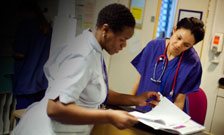![Fine20Rolls20event[1]](http://www.kcl.ac.uk/blank/CachedImage.axd?ImageName=%2fnewsevents%2fevents%2feventsrecords%2f2010%2fImages%2fFine20Rolls20event%5b1%5d.jpg&ImageWidth=224&ImageHeight=135)
The Fine Rolls event
A project to translate and digitalise documents drawn up for Henry III to record money and favours owed to him, is nearing completion. The ‘Fine Rolls’ of Henry III are written in Latin on parchment, with one for every year of his 56 year reign, some containing more than 35,000 words, and measuring up to three metres in length.
This three-year project has brought to life remarkable material which is now freely available to everyone. The rolls, containing two million words in 40,000 separate entries, have been translated into English and encoded electronically, creating indexes and search facilities.
The website (www.finerollshenry3.org.uk ) has digitized images of all the rolls and it is possible to look through them membrane by membrane and zoom in on a particular entry.
With funding of £1 million from the Arts & Humanities Research Council, the project, formally known as ‘From Magna Carta to the Parliamentary State: The Fine Rolls of King Henry 1216-1272’ has been a joint venture between scholars at three institutions – King’s College London, The National Archives and Canterbury Christ Church University. The pioneering technical work has been carried out by the Centre for the Computing in the Humanities Department at King’s.
Leading this project is David Carpenter, Professor of Medieval History at King’s College London, who comments: ‘The project is a perfect example of a collaborative enterprise that develops and exploits the latest technology in order to open up a major a historical source to a wide community of users, public as well as academic.’
The Fine Rolls of Henry III (1216-1272) are preserved in the National Archives at Kew, and, as well as recording ‘fines’ - which are essentially an agreement to pay money for a concession - they contain a wealth of other material. Examples include the taxation of towns, the seizure of lands into the King’s hands because of rebellion, and even Henry III’s sense of humour.
One element of the website is the ‘Fine of the Month’ feature which offers regular comment on discoveries in the rolls. This began in December 2005 so there are now 60 of them.
Professor Carpenter explains: 'Fines of the Month have been about places across the country,– from Nunney in Somerset to Mansfield in Nottinghamshire, and have furthered the impact of the project, enabling it to establish contact with local communities. They deal with the development of general taxation and the emergence of the parliamentary state.’
The latest for November is an entirely new exposition of Archbishop Langton’s role in creating the Magna Carta. Others deal with the persecution of the Jews, peasant uprisings and the position of women after Magna Carta.
Dr Louise Wilkinson, a Senior Lecturer in Medieval History at Canterbury Christ Church University, who is one of the project’s co-directors and has been closely involved in managing the project since its inception in 2005, says: ‘One of the most rewarding things about working on this project is the way in which it has not only greatly enriched our understanding of thirteenth-century politics and society, but also yielded valuable information for local communities who are interested in uncovering information about their past.’
To celebrate the completion of this work a reception was held last night (Wednesday 24 November) in the Maughan Library of King’s College London, which is a most appropriate setting as it has links with Henry III. The building is on the site of the house for converted Jews which he founded in 1232, and his statue is above the gateway. In addition, the present building was home to the Public Record Office where the rolls were held for over a century before their move in the 1990s to their new home in the National Archives at Kew. Guests include Lord Douro, Chairman of King’s College London, Professor Rick Trainor, Principal of King’s College London, Professor Sir Alan Wilson, AHRC Chairman, Professor Rick Rylance, AHRC Chief Executive and Professor Jan Drucker, Senior Pro Vice-Chancellor of Canterbury Christ Church University.
[Image by Naresh Verlander: Professor David Carpenter, AHRC Chief Executive Professor Rick Rylance, AHRC Chairman Professor Sir Alan Wilson, Lord Douro and the Principal, Professor Rick Trainor].
Notes to Editors King’s College London
King’s College London is one of the top 25 universities in the world (2010 QS international world rankings), The Sunday Times ‘University of the Year 2010/11’ and the fourth oldest in England. A research-led university based in the heart of London, King’s has nearly 23,000 students (of whom more than 8,600 are graduate students) from nearly 140 countries, and some 5,500 employees. King’s is in the second phase of a £1 billion redevelopment programme which is transforming its estate.
King’s has an outstanding reputation for providing world-class teaching and cutting-edge research. In the 2008 Research Assessment Exercise for British universities, 23 departments were ranked in the top quartile of British universities; over half of our academic staff work in departments that are in the top 10 per cent in the UK in their field and can thus be classed as world leading. The College is in the top seven UK universities for research earnings and has an overall annual income of nearly £450 million.
King’s has a particularly distinguished reputation in the humanities, law, the sciences (including a wide range of health areas such as psychiatry, medicine, nursing and dentistry) and social sciences including international affairs. It has played a major role in many of the advances that have shaped modern life, such as the discovery of the structure of DNA and research that led to the development of radio, television, mobile phones and radar. It is the largest centre for the education of healthcare professionals in Europe; no university has more Medical Research Council Centres.
King’s College London and Guy’s and St Thomas’, King’s College Hospital and South London and Maudsley NHS Foundation Trusts are part of King’s Health Partners. King’s Health Partners Academic Health Sciences Centre (AHSC) is a pioneering global collaboration between one of the world's leading research-led universities and three of London's most successful NHS Foundation Trusts, including leading teaching hospitals and comprehensive mental health services. For more information, visit: www.kingshealthpartners.org.
Canterbury Christ Church University
Canterbury Christ Church University has, since its foundation by the Church of England as a teacher training college in 1962, developed a wide range of taught programmes, research and educational services.
It continues to be the largest centre of higher education in Kent for the major public services. The University has around 18,000 students based in five Faculties: Arts and Humanities, Business and Management, Education, Health and Social Care, Social and Applied Sciences. Our 1,500 staff also contribute to the University's life and work at our five campuses: Canterbury, Broadstairs, Folkestone (in partnership with the Creative Foundation), Medway (in partnership with the Universities of Greenwich and Kent with Mid-Kent College) and Tunbridge Wells.
AHRC
The Arts and Humanities Research Council (AHRC) supports world-class research that furthers our understanding of human culture and creativity. Each year the AHRC provides approximately £112 million from the Government to support research and postgraduate study in the arts and humanities, from languages and law, archaeology and English literature to design and creative and performing arts. In any one year, the AHRC makes approximately 700 research awards and around 1,350 postgraduate awards. Awards are made after a rigorous peer review process, to ensure that only applications of the highest quality are funded. The quality and range of research supported by this investment of public funds not only provides social and cultural benefits but also contributes to the economic success of the UK. http://www.ahrc.ac.uk/Pages/default.aspx
National Archives at Kew
The National Archives is the UK government's official archive, containing over 1,000 years of history. They give detailed guidance to government departments and the public sector on information management and advise others about the care of historical archives. http://www.nationalarchives.gov.uk/
For more information
Email: pr@kcl.ac.uk or Tel: 0207 848 3202.
View the original article here



 Expression of the Barx1 gene (red) in early tooth development
Expression of the Barx1 gene (red) in early tooth development 2012 Logo on the side of GSK's headquarters
2012 Logo on the side of GSK's headquarters
![AlisonWolf[2010]](http://www.kcl.ac.uk/blank/CachedImage.axd?ImageName=%2fnewsevents%2fnews%2fnewsrecords%2f2010%2fImages%2fAlisonWolf%5b2010%5d.jpg&ImageWidth=224&ImageHeight=135)

 ‘Our Johnny’ by Marcus Stone. From Charles Dickens: 'Our Mutual Friend'
‘Our Johnny’ by Marcus Stone. From Charles Dickens: 'Our Mutual Friend'
 Left to right: Professor Brian Millar, Professor Nairn Wilson, Simon Gambold, Dale Cooper
Left to right: Professor Brian Millar, Professor Nairn Wilson, Simon Gambold, Dale Cooper 



 Head of Department Professor Mervyn Frost with former heads of the Department of War Studies
Head of Department Professor Mervyn Frost with former heads of the Department of War Studies


![Fine20Rolls20event[1]](http://www.kcl.ac.uk/blank/CachedImage.axd?ImageName=%2fnewsevents%2fevents%2feventsrecords%2f2010%2fImages%2fFine20Rolls20event%5b1%5d.jpg&ImageWidth=224&ImageHeight=135) The Fine Rolls event
The Fine Rolls event Paul Rothman signing the agreement with Professor Sir Robert Lechler.
Paul Rothman signing the agreement with Professor Sir Robert Lechler.
